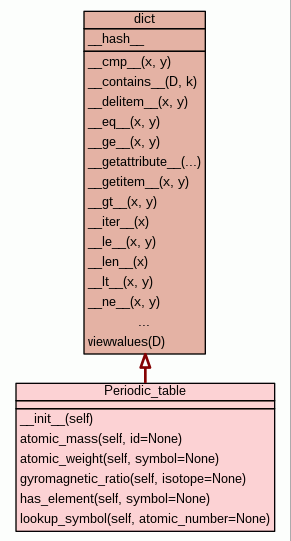
| Trees | Indices | Help |
|
|---|
|
|

The periodic table object.
|
|||
new empty dictionary |
|
||
| Element instance |
|
||
|
|||
| float |
|
||
| float |
|
||
| float |
|
||
| bool |
|
||
| str |
|
||
|
Inherited from Inherited from |
|||
|
|||
|
Inherited from |
|||
|
|||
|
Inherited from |
|||
|
|||
Set up the periodic table object.
|
Add an element to the table.
|
Return the matching isotope container.
|
Return the isotopic atomic mass or standard atomic weight as a float.
|
Return the standard atomic weight as a float for the given atom.
|
Return the gyromagnetic ratio for the isotope.
|
Check if the periodic table contains an atom for the give symbol.
|
Return the atomic symbol corresponding to the atomic number Z.
|
| Trees | Indices | Help |
|
|---|
| Generated by Epydoc 3.0.1 on Wed Sep 30 14:41:08 2015 | http://epydoc.sourceforge.net |